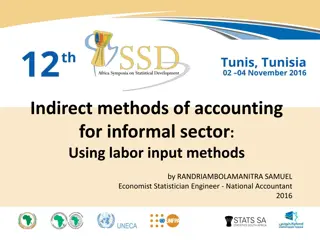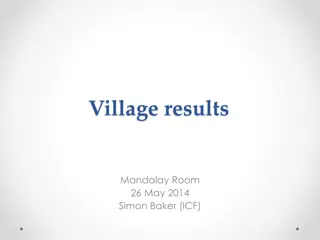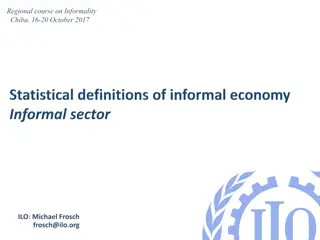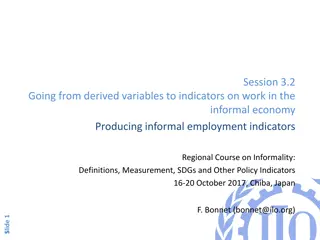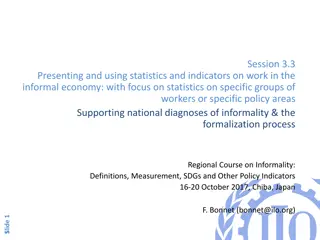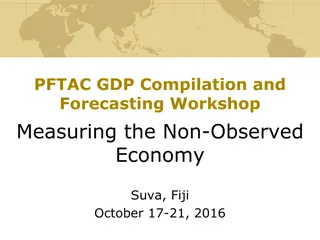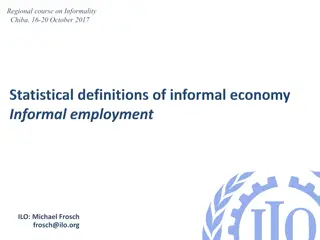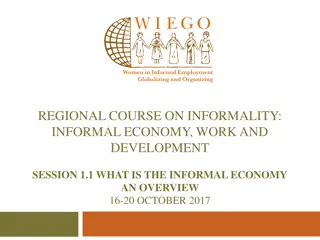Understanding the Role of Informal Economy and Entrepreneurship in Socio-Economic Transformation
The informal economy comprises economic activities not covered by formal arrangements. In Rwanda, self-employment in informal enterprises is common, with characteristics such as ease of entry and low skills. Globally, 2 billion workers are informal, with high risks of poverty and inferior working conditions.
Download Presentation

Please find below an Image/Link to download the presentation.
The content on the website is provided AS IS for your information and personal use only. It may not be sold, licensed, or shared on other websites without obtaining consent from the author. Download presentation by click this link. If you encounter any issues during the download, it is possible that the publisher has removed the file from their server.
E N D
Presentation Transcript
The role of Informal economy and entrepreneurship in socio- economic Transformation OstenChulu UNDP Rwanda
What is the Informal Economy? In 2015, the ILO described the informal economy as referring to all economic activities by workers and economic units that are in law or in practice not covered or insufficiently covered by formal arrangements. The informal economy does not cover illicit activities.
Total Population The Informal Economy: Labour Force Framework Working age population Non-working age population In labour force Not in labour force Unemployed Employed Formal employment Informal employment Employment Outside the Informal Sector Employment in the informal sector
Self-employment in informal enterprises: employers own account operators (don t employ anyone else) unpaid contributing family workers Features of Informality Ease of entry Small scale of activity Self employment, with a high proportion of family workers Little capital and equipment Labour intensive technologies Low skills Low level of organisation Wage employment in informal jobs: non-standard employees of informal enterprises non-standard employees of formal enterprises casual or day labourers industrial outworkers (also called homeworkers)
Across the world, 2 billion workers 61% of all workers including agriculture are informal workers. Informality has a strong rural dimension, with about 3 out of every 5 informal workers living in rural areas Agriculture and industry sectors are the most exposed to informality Within households, a majority of working households rely solely on informal employment A large number of children and older individuals live in completely informal households Informal economy workers face high risks of occupational risks in inferior working conditions and are most likely to fall into poverty CHARACETRISTICS OF THE INFORMAL ECONOMY
The Informal Economy in Rwanda Rwanda s definition: The Informal Sector is defined as all persons 16 years of age and above who were engaged in unregistered private business enterprises that do not keep written records of accounts. Composition Domestic workers Hawkers Taxi bicycles Street vendors Barbers and hairdressers Workers in restaurants Casual labourers in mines, tea plantations Other unregistered service providers 73.4% of total employment outside agriculture are in the informal sector Three out of every four people in Rwanda are employed in the informal sector. For women, the percentage reaches 80%.
Segmented labour markets/ employment structures What do we mean by segmentation? Constraints exist which prevent individuals from moving into better employment opportunities (or improving the quality of existing employment) What causes segmentation? Discrimination, social norms, unequal wealth/assets, lack of credit, lack of public goods/services, etc Unpaid care responsibilities Why does segmentation matter? Reinforces existing patterns of poverty and social exclusion. Issue of equity: class, gender, racial, caste segmentation. Issue of basic rights and the choices available to individuals.
Segmentation of the informal economy: Segmentation by Sex Average Earnings Poverty Risk Employer Predominantly Men High Low Regular wage workers Own account operators Men and Women Casual wage operators Industrial Outworkers /Homeworkers Predominantly Women Unpaid Family Workers High Low
Measuring GDP: GDP by Production Mode NISR produced GDP by product mode up to 2012 2009 2010 2011 2012 2009 2010 2011 2012 Gross Domestic Product in % 100 100 100 100 Gross Domestic Product in % 100 100 100 100 Formal sector % 22 24 23 24 Formal sector % 22 24 23 24 Industry % 4 5 5 4 Informal sector (monetary) in % 48 46 46 46 Services % 12 13 12 14 Non-monetary in % 20 19 19 19 Adjustments % 6 6 6 6 Informal sector (monetary) in % 48 46 46 46 Government and NGOs in % 10 11 12 11 Agriculture % 21 20 20 20 Industry % 10 9 10 11 Non-monetary GDP includes: household labour, care giving, civic activity or even friends doing something for each other that does not have a monetary value but remains a vitally important part of the economy. If lumped up with informal sector GDP yields on average 65% of GDP as informal Services % 17 17 16 16 Non-monetary in % 20 19 19 19 Agriculture % 13 12 12 13 Industry % 1 1 1 1 Services % 6 6 5 5 Government and NGOs in % 10 11 12 11 Services % 10 11 12 11
Average monthly earnings from employment activity (Formal and Informal) RLFS 2020 Rwanda Total 63 291 Male 75 415 Female 47 126 Total (16+ yrs) age group 16-24 yrs 29 442 33 383 24 559 25-34 yrs 72 530 83 961 56 398 35-54 yrs 81 174 97 269 59 351 55-64 yrs 65 151 86 150 40 687 65+yrs 47 007 61 904 19 010 Urban Rural Total Male Female 111 277 Total 35 121 Male 41 947 Female 26 104 147 432 173 798 Total (16+ yrs) Total (16+ yrs) age group 16-24 yrs age group 16-24 yrs 25 901 28 708 21 838 39 955 52 014 30 460 25-34 yrs 39 388 47 002 29 197 25-34 yrs 153 880 168 144 130 914 35-54 yrs 39 379 48 586 27 891 35-54 yrs 213 826 231 228 182 846 55-64 yrs 32 777 42 821 21 456 55-64 yrs 257 907 318 931 171 094 65+yrs 25 694 30 388 17 813 65+yrs 188 848 221 186 36 036
But informality plays a crucial role in Rwandas development But informality plays a crucial role in Rwanda s development The informal sector accounts for over 65% of GDP 90% of all firms, micro, small and medium enterprises are informal Currently, approximately 72% of the total employed population is informal (LFS) 93% of firms have fewer than five employees But we cannot address informality without looking at earnings from employment activities 23.5% GDP contribution by Formal Sector - 10% of all businesses 65% GDP Informal 90% of all businesses
We have a problem You dont count if youre not counted Measuring the Non-Observed Economy ECONOMIC WELL BEING Leisure Non-market activity Wealth (Unemployment) (Insecurity) HAPPINESS Family Friends Work Satisfaction Communities 02 01 03 GDP: Observed Economy LIVING CONDITIONS Environment Health Education Inequality (Expenditure) Sum of final Expenditures = (Income) Sum of income payments and costs incurred in production = (Production) Sum of gross value Added 04
= GDP The Real Wealth of Nations + BUILT CAPITAL Roads, Dams, Buildings, machinery and Equipment HUMAN CAPITAL Knowledge, Aptitude, Education and Skills OBSERVED = NON-OBSERVED INCLUSIVE WEALTH - UNEP + NATURAL CAPITAL Forests, Agricultural land, the Atmosphere, Oceans, Ecosystems, Subsoil resources SOCIAL CAPITAL Community, Shared Values, Vision, Shared Identity
Rwandas Development Conundrum: Tradeoff between Natural, Built and Human Capital Population Employed by type of Capital and Value Added as % of GDP - World Bank Estimates Growth of Capital 1990 - 2014 60 70 50 61.7 60 40 49.3 50 30 40 20 29.2 30 24.1 10 20 18 0 1995 2000 2005 2010 2014 9.1 10 -10 Human Capital Produced Capital Natural Capital 0 Human Capital Produced Capital Natural Capital Employment Value Added
Formalising the informal economy Most informal sector operators use Natural Capital for their livelihoods The value of that Natural Capital element is difficult to measure How do we account for the livelihoods of the majority of the population who depend on Natural Capital Alternatively, how can we transform/formalise informal entrepreneurship?
Four policy options to tackle informal entrepreneurship Formalise informal entrepreneurship (Most viable policy choice) But: The other unacceptable options can have their uses too: De-regulate formal entrepreneurship (Unacceptable) Eradicate informal entrepreneurship (Unacceptable) Do nothing (Unacceptable) Doing nothing: Sometimes can be supportive to small-scale entrepreneurial endeavour for closer social relations Direct controls: Seek compliant behaviour by ensuring that benefits of operating in formal economy outweigh the cost of working in the informal economy. Leaves intact the existing negative impacts such as: Results in levelling down rather than levelling up of working conditions Leads to governments repressing enterprise culture and jobs Unfair competition - formal businesses No access to credit to expand informal businesses No guarantee that health and safety standards have been followed customers Taxes owed are not collected Governments Stick - increase the cost of non-compliance De-regulate: Useful when seeking to simplify compliance especially for business start-ups Carrot make the conduct of formal entrepreneurship more beneficial Indirect controls: Seek behaviour change through a social contract between state and citizens based on high trust, high commitment culture Eradication: Useful for tackling those who fail to comply
Conceptual Framework: Formalising informal sector entrepreneurship Data matching and sharing, joined-up strategy and operations Improved detection Deterrents ( sticks ) Increasing sanctions, advertising penalties Increased penalties Direct controls Simplify compliance, direct and indirect tax incentives, supply chain responsibility, support and advice to start- ups For businesses Supply side incentives (e.g., society-wide amnesties, voluntary disclosure, smoothing transaction to formalisation) Incentives ( carrots ) Tackling informal sector entrepreneurship For individuals Demand-side incentives (service vouchers, target direct taxes, targeted indirect taxes) Tax education, normative appeals, education and awareness raising of benefits of declared work Change informal institutions (values, norms, and beliefs) Reduce asymmetry between formal and informal institutions Indirect controls Procedural fairness and justice, redistributive justice, wider economic and social developments Change formal institutions (laws, regulations and codes) Williams, CC : Informal Sector Entrepreneurship (https://www.oecd.org/employment/leed/Background-Paper-PB-Informal-Entrepreneurship-final.pdf)
WE NEED MORE THINKING O U R I N -T R A Y I S G R O W I N G VISIONS OF THE FUTURE OUR POLICIES LNOB GDP of the poor? Non-observable GDP and how to measure informal economy realistically? Are we putting a proper value on Natural Capital on which a large proportion of the population depends? Direct or Indirect Controls: Its not one or the other both are required! Which policy mix is most effective to elicit formalisation? THE ECONOMICS TO ACHIEVE THEM FIXING THE DUAL ECONOMY Move away from deterring informal entrepreneurship and towards the use of incentives and indirect controls to formalise the informal sector How do we account for undeclared work? How do we improve the data/information ecosystem
Build Back Better Build Back Better Thank You! Thank You!




